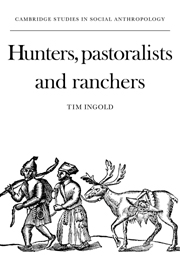Book contents
- Frontmatter
- Contents
- List of figures and tables
- Preface
- Prologue: On reindeer and men
- 1 Predation and protection
- 2 Taming, herding and breeding
- 3 Modes of production (1): hunting to pastoralism
- 4 Modes of production (2): pastoralism to ranching
- Epilogue: On band organization, leadership and ideology
- Locations of circumboreal peoples
- Appendix: The names and locations of circumboreal peoples
- Notes
- Bibliography
- Author index
- Subject index
Prologue: On reindeer and men
Published online by Cambridge University Press: 12 September 2009
- Frontmatter
- Contents
- List of figures and tables
- Preface
- Prologue: On reindeer and men
- 1 Predation and protection
- 2 Taming, herding and breeding
- 3 Modes of production (1): hunting to pastoralism
- 4 Modes of production (2): pastoralism to ranching
- Epilogue: On band organization, leadership and ideology
- Locations of circumboreal peoples
- Appendix: The names and locations of circumboreal peoples
- Notes
- Bibliography
- Author index
- Subject index
Summary
Some years ago, I undertook a spell of anthropological fieldwork among the Skolt Lapps of northeastern Finland. These people were, so I imagined, reindeer pastoralists. Yet when I arrived in the field, the promised herds were nowhere to be seen. On inquiry into their whereabouts, I was assured that they did exist, scattered around in the forest and on the fells, and that before too long, a team of herdsmen would be sent out to search for them. Well then, I asked, should I purchase a few animals myself? Certainly not, came the reply, for the chances of ever getting my hands on them again would be remote. They could, after all, take refuge in every nook and cranny of a range of wilderness extending over several thousand square miles. Considering that the sponsors of my research would hardly countenance such an unlikely investment, I acted on the advice of my informants, and never acquired a single reindeer. But I remained bewildered. What kind of economy was this, in which live animal property roamed wild over the terrain, quite beyond the ken of its possessors, and in which simple common sense appeared to dictate against owning any animals at all?
This book owes its origins to my attempt to resolve this enigma. For in posing the question why, if the herds are wild, do we not find a hunting economy, I was led directly to inquire into the affinities and contrasts between hunting and pastoralism in the far north.
- Type
- Chapter
- Information
- Hunters, Pastoralists and RanchersReindeer Economies and their Transformations, pp. 1 - 26Publisher: Cambridge University PressPrint publication year: 1980



